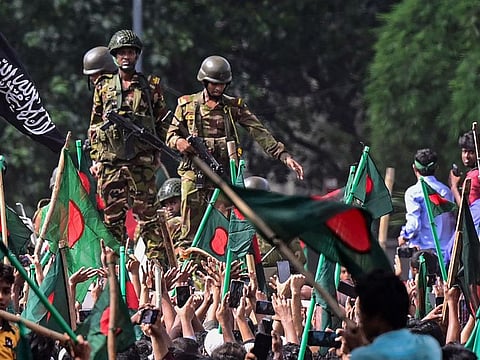Bangladesh: Five things you need to know about the country rocked by protests
It has a history of political instability and heightened vulnerability to climate change

DHAKA: Bangladesh, whose ex-prime minister Sheikh Hasina resigned and fled on Monday under pressure from protesters and the army, has a history of political instability and a heightened vulnerability to climate change.
Five things to know:
Political instability
Bangladesh won its independence from Pakistan in 1971 after a brutal conflict that killed an estimated three million people, only to suffer a devastating famine three years later.
Independence hero Sheikh Mujibur Rahman, Hasina’s father, led the country until soldiers assassinated him and most of his family in a 1975 coup.
Bangladesh, home to 170 million people, has seen numerous coups, counter-coups and periods of military rule in the decades since.
Its politics since the 1990s have often hinged on the rivalry between Hasina and Khaleda Zia, two-time prime minister and daughter of the president who succeeded Hasina’s father.
Climate change front line
Bangladesh, with its low-lying coast on the Bay of Bengal, is among the countries ranked most vulnerable to disasters and climate change, according to scientists.
Heatwaves are getting hotter and cyclones - which have killed hundreds of thousands of people in Bangladesh in recent decades - are becoming longer, more intense and more frequent due to the impact of climate change.
Better forecasting and more effective evacuation planning have nonetheless dramatically reduced death tolls.
Largest mangrove forest
As a defence against storm surges and cyclones, the country has the world’s largest mangrove forest, the Sundarbans, which straddles Bangladesh and India and is home to the endangered Bengal tiger.
The forest was declared a UNESCO World Heritage Site in 1997.
Mangroves protect coastlines from erosion and extreme weather events. They can help fight climate change by sequestering millions of tonnes of carbon each year.
But the mangroves are under threat. India and Bangladesh jointly opened a coal-fired power plant in 2022 just 14 kilometres (nine miles) from the edge of the Sundarbans despite a backlash from environmental campaigners.
Garment factories
Bangladesh was one of the world’s poorest countries at independence but has seen an economic boom this century, in large part due to its thriving garment industry.
It makes around $50 billion in annual export earnings from the textile trade, which services leading global brands including H&M, Gap and others.
Bangladesh has recorded average annual growth of more than six percent since 2009 and overtook India in per capita income terms in 2021.
But the dividends of economic growth have been shared unequally, with government data in 2022 showing that 18 million Bangladeshis aged 15-24 were out of work.
Thousands of garment factory workers clashed with police late last year during a campaign for a minimum monthly wage worth $195, up from the $70 set by the government in 2018.
Nobel winner
Bangladeshi microfinance pioneer Muhammad Yunus was awarded the 2006 Nobel Peace Prize for his work promoting economic development in his country.
The respected economist, now 84, is credited with lifting millions out of poverty with his pioneering microfinance bank but was considered a dangerous rival by Hasina, who has accused him of “sucking blood” from the poor.
Yunus, currently in Europe, was sentenced to six months in jail in January 2024 after being found guilty of violating labour laws in a case condemned by rights groups as politically motivated.
Student leaders said on Tuesday they would meet Bangladesh’s military to demand Yunus helm a caretaker government to run the country in the wake of Hasina’s ouster.
Sign up for the Daily Briefing
Get the latest news and updates straight to your inbox



